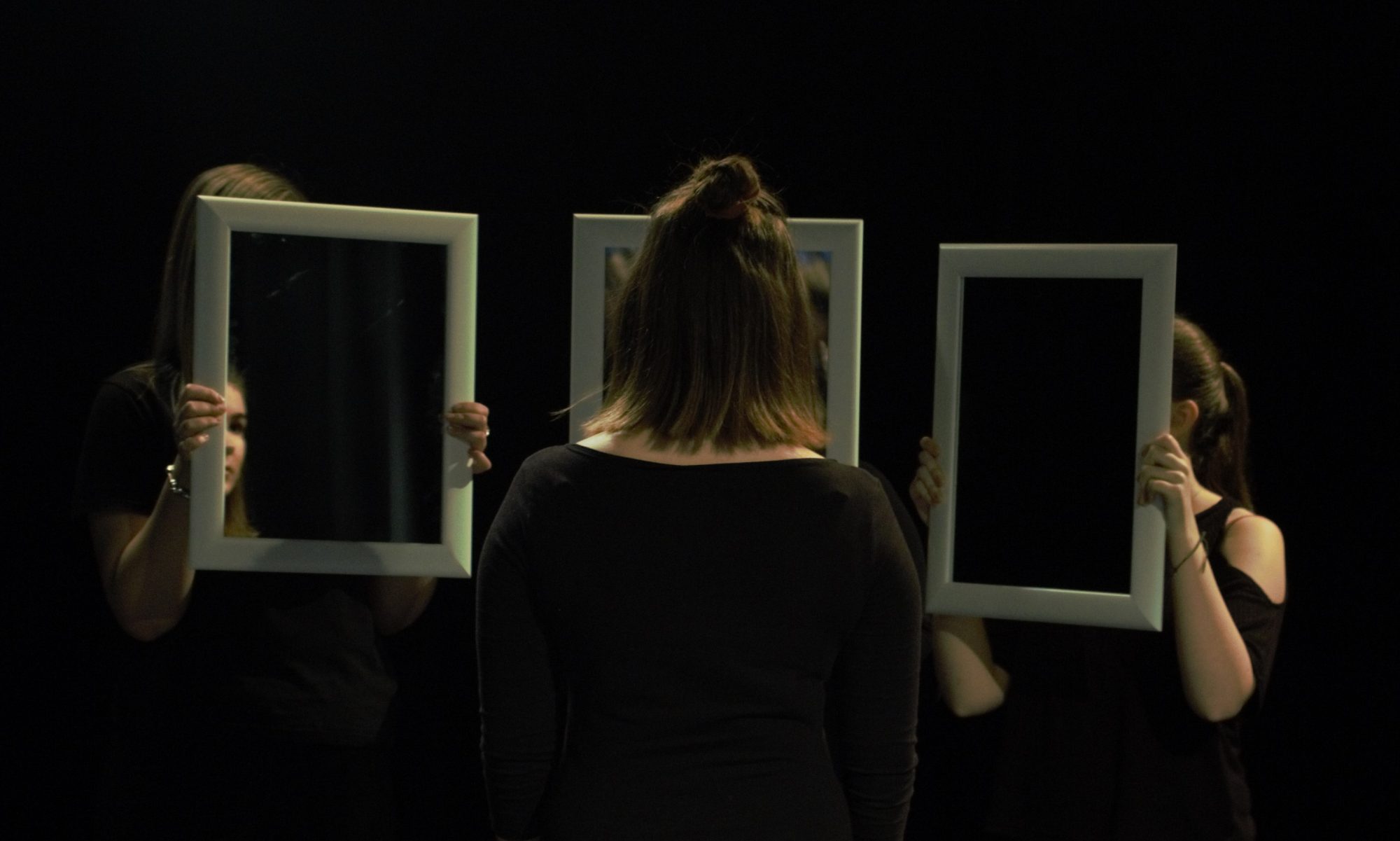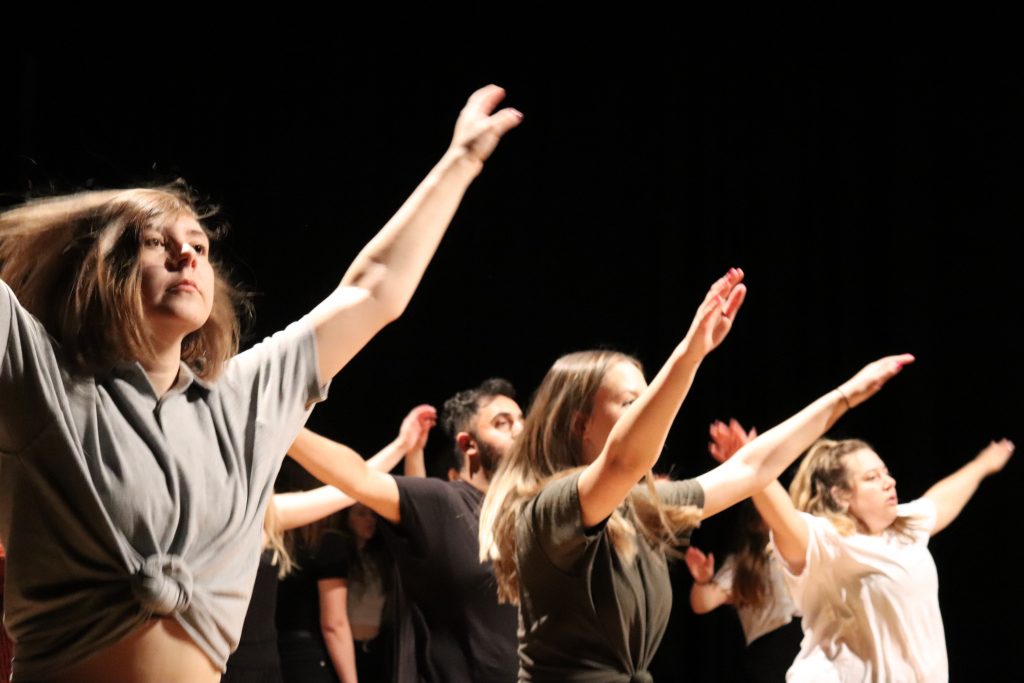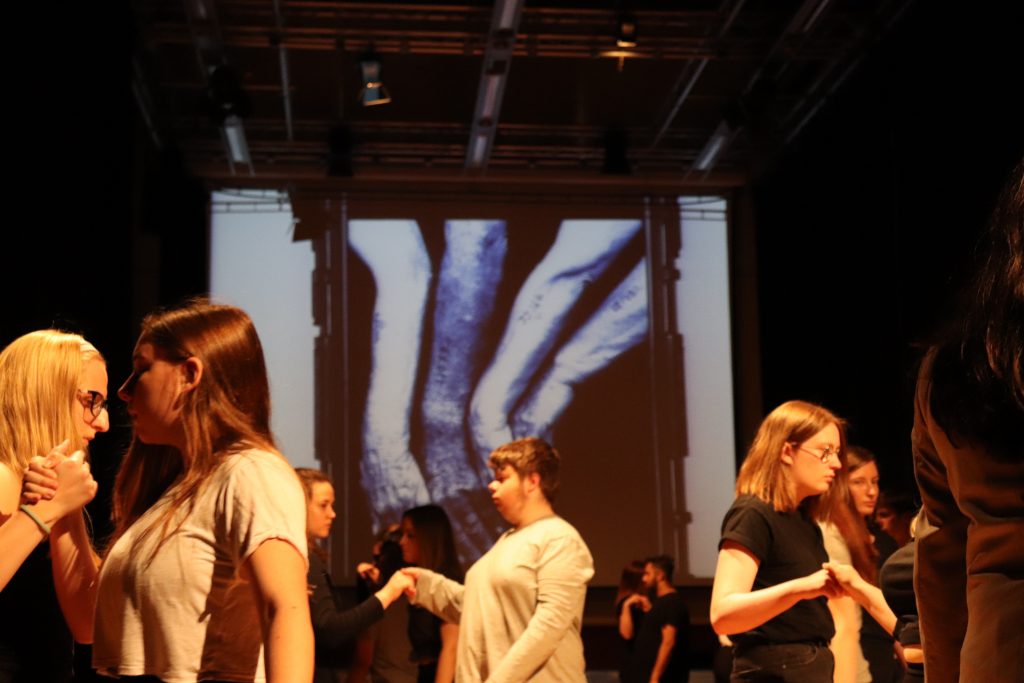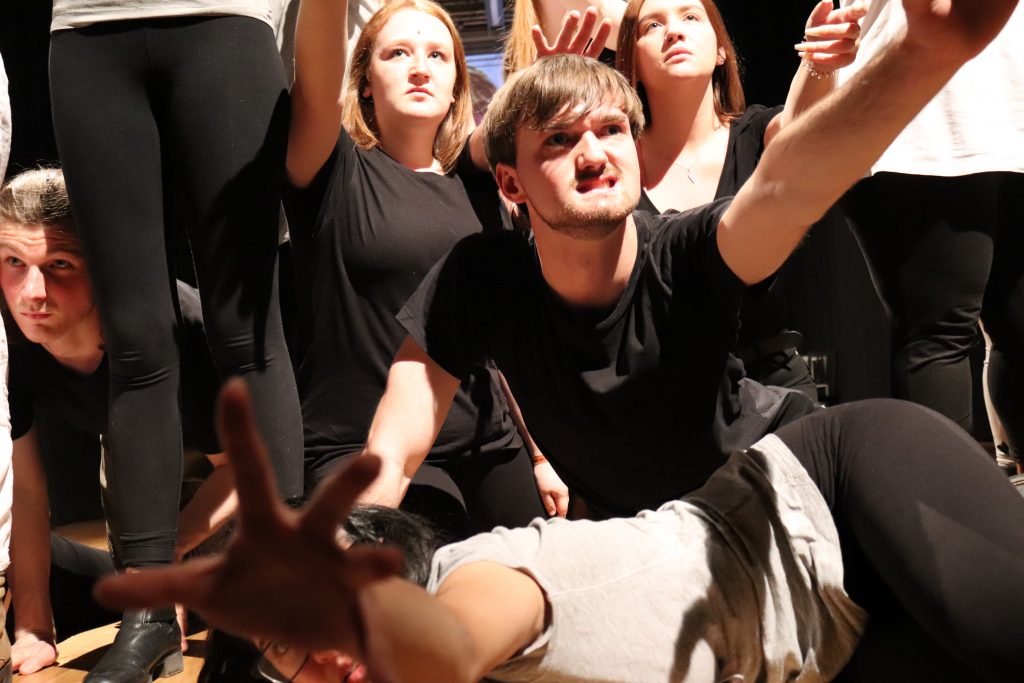Questions
- Could you tell us how you would identify yourself as a practitioner and the context in which you’d like to work including who your audience or target market would be?
I love working with people. I always have, whether that’s as a co-creator, or working with a group as an ensemble, or directing a group of people. I find that I get a greater response from myself when I can see that people are enjoying the work that they are creating. I believe that drama and theatre and performance should be accessible to all, not just in terms of being an audience, but in terms of your own personal involvement. If someone wants to be involved why should anything stop them? I know that this question could come across as slightly naïve but it’s a goal to strive towards, and for something that I want to implement into my own practice, as I want to be a teacher, this is something that I want to put into place in my classroom, that if a child wants to achieve something who am I to tell them they can’t and to hold them back.
I think that children should always have access to creativity, that we should not be limiting their minds, and the arts broadens them. It gives them a different way of thinking, a different perspective. The opportunity to be in a classroom as a teacher, gives me the opportunity to help children to discover what is they enjoy, and to give them access to the creative arts. I would love to be able to have a school club that focuses on creating theatre with the children, so that they can learn something about themselves and continue to learn about the world around them, but in a safe environment. In terms of the target audience, it would probably be a target audience of children, young people. But this would be something that would be a discussion with the group, to ask their opinion so they are used to making their own decisions. I don’t want to always just be giving them direction all the time, I would like it to be a collaborative process, to work with them.
Another aspect of my life that I feel identifies me is through my photography, I have been taking photos since a very young age, always loving the aspect of being able to make a memory and moment last forever. I would to be able to in the future, go into performance photography, something I have not yet tried. However, I have got many photos of my travels around the world.
- How is your identity as a practitioner reflected in the portfolio; and produced by the portfolio?
The projects that I identify in my portfolio I feel showcase who I am as a practitioner. Truth be truth till th’end of reck’ning is a collaborative performance showing that I enjoy working collaboratively in a group to create something big. Taking inspiration from something I have witnessed and experienced myself to be put into a performance for someone else to witness. Continuing to put theatre and performance into the world.
My It’s Not Ok project with the secondary school children was one that helped me to solidify my knowledge that I wanted to work with children to create performance. Working off of their enthusiasm and willingness to create. This work is the kind of work that I want to continue to create, I want to take a subject and work with a group of children to create a performance in response to this topic. To help give them a sense of achievement within their abilities and themselves.
The Separation of Ugly is a performance that taught me a lot about how I want to work in the future, about what things to consider in a performance and what to change. It was a real learning curve for me. The performance in itself helps to showcase me a practitioner by showing that I again, like to work with a group of people. Within this performance I was the director of a cast and not in the performance myself, which did give me a greater perspective.
Each of these performances and projects has given me the opportunity to see myself grow as a practitioner, to understand how different people work and to how to adapt myself into different social scenarios for the creation process. Furthermore, everything that I have learnt from the creation of these performances will benefit me in teaching, learning to adapt, to be patient with a process and with people, to understand that not everything will go the way that you imagined it and many more. Most importantly though, it has taught me how exceptionally wonderful it is to see children, and people to succeed in what they do and love. Through my theatre Instagram you can view some of the performances that I have helped to create and have been apart of, this gives people the opportunity to view my style and areas of interest, alongside being able to keep a record of all my work for myself.
Additionally, I have added a link to my professional photography Instagram page, which showcases my photos. Giving potential employers the opportunity to view my work, and getting my name out into the world.
- Drawing on evidence from your portfolio, what would you identify as the most significant moment of insights to your learning as a practitioner?
Working with people has to be my biggest insight into my learning as a practitioner. Nearly everything that I do is working with people, working off of what people say, and working with people to achieve my end goal. When creating a performance or project it’s not just the people who are in the cast that you need to work with to succeed, it requires a wider branch of people. For example, for my performance of The Separation of Ugly, I had to work closely with the lighting and sound technicians to so that I could access the lighting and sound that I wanted for the performance. I also had to work with people form outside of my cast to help me run my lighting during the performance, as this was something that I felt would benefit from an extra pair of hands.
Moreover, I would probably say this project in particular was where I learnt the most about who I am as a practitioner and as a facilitator. During my creation process I knew that I was strongest in workshop delivery and a facilitator, so I wanted to use this to my advantage during my creation and rehearsal process. I would go into each rehearsal knowing with a moment or scene in mind that I wanted to work on but would try different exercises and activities to be able to see what could be created in the space, as I knew that if I went in with a solid idea in my head and I couldn’t execute it then I would feel as if I had failed and I would lose motivation. I learnt that I need to be able to play with an idea and find a moment that worked from what was created in the space.
Additionally, to all of this, working with people for me as a practitioner is a way of giving back and helping to show achievement. When my group first started working with our group of children at the school in Hull on the It’s Not Ok project, they were slightly resistant to us and were not very forth coming with ideas, but as soon as we assured them that we were there to explore ideas and to have fun they loosened up and we got some productive work done. I believe that when working with children you sometimes have to let them know that it’s okay to have fun and be silly in order for them to become productive, as long as it is not taken too far and that you as the facilitators still have control.
- What do you want to do next and how do your think your portfolio evidences and helps this ambition?
My goal for the immediate future is to become a primary school teacher. To get there I need to complete my PGCE with QTS. When initially applying to university for my undergraduate degree I had thought about applying straight for primary education. However, I decided to do my degree in Drama: Education and Community as my undergraduate. I feel that this has given me the opportunity to explore the world of theatre a performance and creativity and learning how I can implement that into my teaching. Having the opportunity to work with different communities is one that prepares you for many different things. In my portfolio I explain about how I worked with children in a secondary school in hull that was in quite an underprivileged area, where they don’t get much access to theatre and performance. By giving them opportunity to be involved in a project like It’s Not Ok, it meant that they could learn about a sensitive subject and could explore a response to what they learn. We could help to educate them on how they could respond in certain scenarios and if they know who to talk to about any issues that they are facing. This also helped me to learn more about safeguarding within schools, so that I could acknowledge them in the schools I work with during my PGCE. Additionally, I have a LinkedIn page and an educational and theatre twitter set up so that I can keep on top of educational developments and keep up to date on theatre and the arts, particularly within education and the community.
However, in the future I would love to run a Youth Theatre that prioritises children who are neglected or bullied. I have always had a lot of sympathy for children who are neglected and a lot of empathy for children who are bullied. I would love to be able to create a safe space where children who suffer can go and feel safe and feel heard. Every child deserved to feel special and feel like they can achieve. Drama can do so much for a person, not just learning about dramatic techniques but learning a lot about yourself, you can either separate yourself from the outside world and know that for those few hours you are safe and able to be who you want to be. You can also explore what you are feeling without feeling like you are in therapy and having to talk about yourself directly. The brilliant thing about drama is that it can be used to help but without causing anymore trauma. Through my theatre Instagram you can see the performances that I have been a part of and have been involved in creating.
Intimacy Workshop
In November 2019 I took part in an intimacy workshop. This workshop aimed to educate on how intimacy should be supported and consented to during the creation of a performance. The main points that I took from the workshop were:
- Intimacy is defined as any moment which portrays intimate physical contact.
- When intimacy is being choreographed in a performance or project then there should always be an additional person present, not just the direct or whoever is running that part of the rehearsal.
- Consent
- It is up to the discretion of the individual to discuss their sexual orientation or past personal trauma.
- Check-in to make sure that everyone is happy and comfortable.
For me, when creating theatre, I would always aim to make sure that everyone is happy and comfortable, having a check-in each session and that people feel comfortable to express their worries and concerns. Additionally, I would adhere to the advice of making sure there was never just me in a space with the cast or company when directing, so that there is someone else always there just to double check a situation if needed.
When it comes to teaching, I would apply what I have learnt from this intimacy workshop by making sure that I am up to date on the school’s safe guarding policy, that I know who the safeguarding officers are and the protocol that I need to follow if there is an issue. In addition to this I will always strive to ensure that my classroom is a safe space for children and teachers. With the children, when learning about any topic I would make sure that no child felt uncomfortable knew that they could talk to me at any time, or if not I would help to find someone that they did feel comfortable confiding in. I believe that by teaching children about consent from a young age will mean that it is just a natural instinct for them. Something that I have seen online, and would like to implement in my classroom would be that every morning when the class line up to come in they would indicate to me how they would like to be greeted, whether this be a high five, a wave, a hug or a fist bump (as long as I am still complying with the school’s policies) so that the children know I am listening to what they want but they also understand that you should always get someone’s consent when it comes to physical touch.
The Separation of Ugly
The Separation of Ugly is a 25 minute performance that I created in my third year of university in the module titled Independent Practice and Research (iPaR). Taking inspiration from Hans Christian Andersen’s The Ugly Duckling, the performance consists of physical theatre and episodic imagery based on the themes of isolation, loneliness and social displacement.
This was a six-month project that used ethnographic and academic research to create. My initial thought process was to ask the question of ‘why do we teach children nursery rhymes and fairy tales that have a sinister background to them?’. If their origins are so dark, why do we then put them into a more childlike setting and change the meanings to lure children into a false sense of security. The story that children are told is one of a little duckling that is bullied by his peers and is looking to fit in and then one day discovers that he is a beautiful swan and finds his family. Whereas in Andersen’s the duckling attempts suicide and endures a lot more suffering than explained in the fairy tale of today.
I took a workshop into a primary school in the local area to explore some of the themes that I had picked out from the story. The aim was to get an understanding of how the children would respond to an image stimulus based on the themes but without any prompts, all coming from them, so that I could know what their understanding was and what it was that mattered most to them. From the information that I gathered; I was able to identify that children notice a scene of bullying and know who they should turn to from this.
I knew that I also wanted to explore what the meaning of the word ‘ugly’ meant. What does it mean to you and what does it mean to me? By creating an online anonymous survey, I could ask people to give examples of when they have felt ugly and isolated. From this I explored how I could turn this into a series of images and movements.
The performance itself focuses on certain plot point that I wanted to show, rather than retelling the entire story as I did not want to recreate something that already exists. It is a performance that is aimed at an older audience but comes from the response of children.
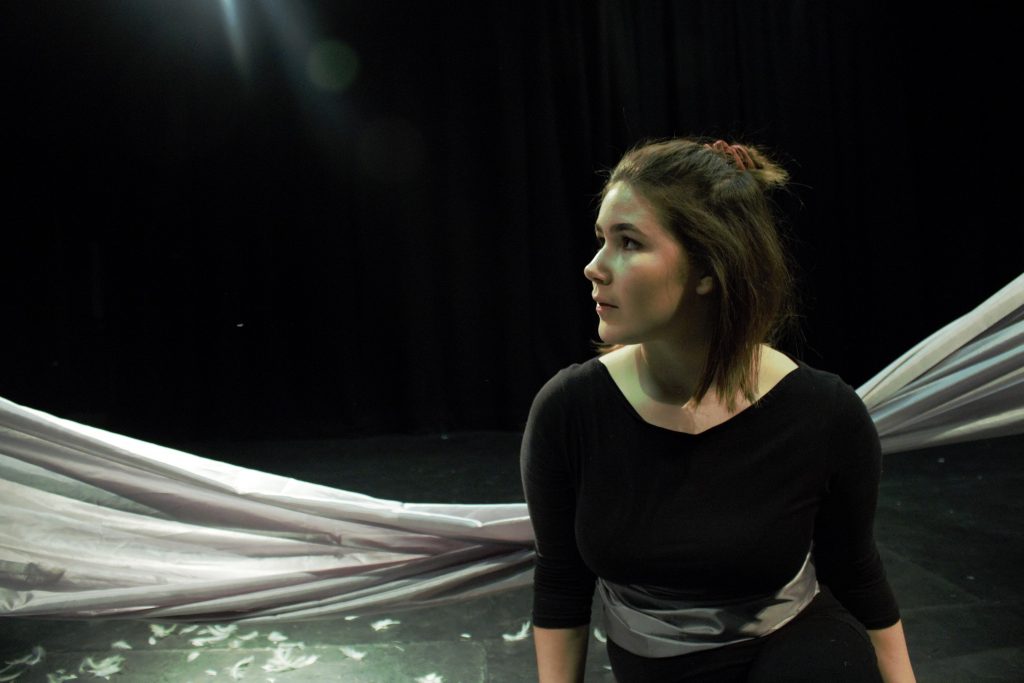
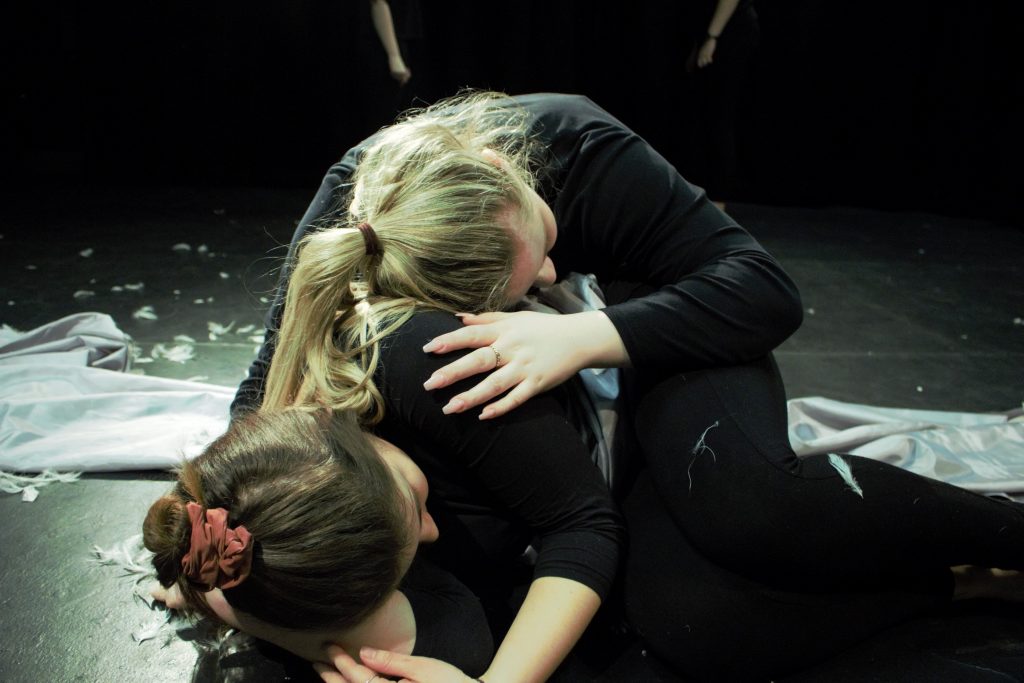
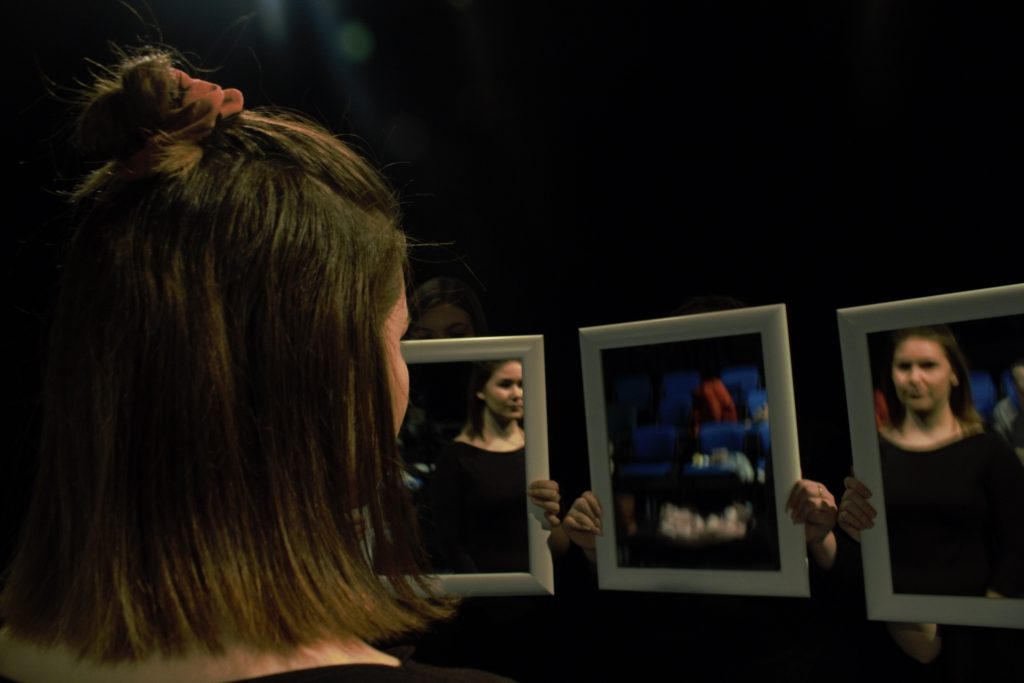
It’s Not Ok
In the beginning of my second year of university I did a module titled Children and Young People. On this module I completed a placement at a Secondary School Academy in Hull working with children aged 12-16.
The aim of the project was to create a five-minute performance over a six-week period in response to the It’s Not Ok campaign. This was a campaign that was created to help educate children in recognising concerning behaviour and identify positive relationships. In the first week the children came to the university and we all watched a performance of It’s Not Ok so that we all had the same contextual knowledge of the performance. From there each week we would go into the school and in smaller groups we would deliver our own workshops to the children using drama games and techniques so that by the last week we could create a performance that would then be performed back at the university. As facilitators we knew that we wanted every main decision to be made by the children so that they felt that they had ownership over their performance, this meant that each week we would come in with a workshop plan based on the direction that children wanted to take the performance in. They chose to focus on one of the main characters and look at their storyline, rather than trying to look at all of them at the same time.
During the workshops that we had with them we experimented with the techniques of Columbian hypnosis, the use of bamboo sticks, and mirror work. All these elements helped to show the themes of control and the social pressures that children feel. Before the final performance there was a decision made to involve us as facilitators in the performance, to perform alongside the children. We felt that this helped to showcase the collaboration and relationship that we had built up with the children over the six-week period.
This project did not come without its challenges though. As the group of children that we were working with came from an after school club it meant that each week the groups changed, we usually had the same children but occasionally there would be an additional person or someone would be missing which would mean that someone would be without a partner. This was when one of us would step in. Additionally, due to the nature of the subject that we were dealing with we had to be aware of any safeguarding issues that arose. We were made aware of the school’s policy and there was always a safeguarding officer available. My group did come across an safeguarding issue resulting in us having to avoid a specific storyline and character, however the children utilised this well, and we facilitated the sessions to make sure that conversation was steered away from upsetting topics.
I thoroughly enjoyed creating this performance with the children, building up their trust and having them feel comfortable enough to be able to discuss difficult topic areas whilst feeling safe. Everyone learnt something the experience.
Truth be Truth to th’end of reck’ning
This was a collaborative performance that I was a part of creating in my second year about what was witnessed on a secular pilgrimage to Auschwitz, combined with the themes and words of Shakespeare’s Measure for Measure. We used our reflections from our trip, and from what we witnessed to create the material for the performance. We were not attempting to recreate what we saw, only to create what we witnessed. It was intended to be a performance that could not be recreated because it was only to be witnessed from what we had witnessed. 90 minutes of episodic fragments forming together to make a collaboration, our understanding of how Auschwitz made us feel and respond to the world around us.
From this process I learned that when creating my own theatre, I prefer to work collaboratively, to be able to bounce ideas around and play with ideas, something that I find difficult when I am on my own as I feel that I cannot gain my own perspective. Being able to step back and look at something as a bigger picture is so valuable to a creation process.
The rehearsal and creation process were a way for me to be able to understand the different ways that people work together and how to compromise. These are skills that I feel will be able to be put into place in teaching. When something does not go to plan and you have to swiftly adapt to the situation it means that you can be versatile and able to think on your feet. Additionally, learning to listen to everyone’s ideas and know when a good time is to input your own is something that I learnt during this creation process. Before this project I had not worked with such a large group of people when we had such independence and control over the performance. I had worked collaboratively in smaller groups, but this was a different experience. A group of people with such a variance of personalities meant that there were occasional clashes and resistance to progress of the project.
Overall, the performance was a journey, literally and figuratively, one that gave me a greater perspective on people, and how we respond to events, situations and relationships.
Social Media
Here are the links to my social media accounts
Linked In:
https://www.linkedin.com/in/rachael-williams-0161341a6/
Theatre Instagram:
https://www.instagram.com/rachaelwilliamstheatre/
Photography Instagram:
https://www.instagram.com/storybyphotos/
Twitter:
https://twitter.com/ed_rachael
Personal Statement
During my primary education years, I struggled with academics, however through dedication, perseverance and self-motivation, I found ways that I could keep up. Because of this I feel that I have the understanding and the empathy for children who find academics a struggle. For my secondary education I went to school in the Middle East. From this I have experienced different cultures and the way that different children experience and value education. I feel that as a teacher, having seen this, I will have a greater understanding of children’s diverse backgrounds and their family’s approach to learning. My undergraduate degree is Drama: Education and community. I learn about all the different ways that you can place drama into community and educational settings. For this I have done a few different placements. My first was in a school in Hull delivering six workshops with children aged 12-16. This solidified my knowledge that I prefer teaching primary aged children, as I find it more fulfilling to interact with younger children and have a stronger passion for drama being used in primary schools as it’s not as accessible to them. My second was with Mind the Gap theatre company. This was an experience that I value highly. I was out of my comfort zone as I had never delivered workshops to adults before. From this I learned how valuable patience, resilience and a good back up plan are when it comes to teaching. My most recent placement was with St Oswald’s Primary school, where I observed and delivered PSHE lessons with years three to four. Working with these children gave me the opportunity to consolidate my reasons for wanting to teach, especially in primary education. During my observations I understood that I needed to plan a session that was accessible to children of mixed ability and age and hold their attention. They thoroughly enjoyed the workshop that I did with them about the themes of the Ugly Duckling. I asked them to walk about the room as if they were experiencing different weather conditions, and to look at three different photos around the topic of bullying and comment on how this made them feel. Throughout my degree I have learned how to make performances accessible, especially for a variety of ages. Because of this I feel that my confidence has grown, and I have become very good at adapting to different situations and last-minute adjustments, something that I know is often required in teaching. During the Easter holidays I observed some teaching in a primary school and spoke to the teachers about their approach to planning and the classroom. I observed three year groups in KS2. At the beginning of every class the teacher shared the lesson objective so that the children knew what they would have learned by the end. I observed different strategies to manage behaviour for example, raising a hand for silence, or clapping a rhythm and receiving a response. There was always a discussion about the answer to a question, as the children were putting their learning into practice as children don’t learn if they are just spoon-fed information. I have a Grade 5 in flute, and have been involved in school plays and choirs since a young age. I strongly believe in the arts being used for good within schools, as they build children’s confidence and gives them a creative outlet. I value all areas of education for children, but I like to think that I could bring a creative twist to the classroom and a school. I believe myself to be a confident, caring, responsible and organised person, qualities that I feel make a strong and reliable teacher. I therefore hope to be a valued student on your PGCE programme.
Curriculum Vitae
CV
Name: Rachael Elizabeth Hannah Williams
DoB: 13/11/1998
Mobile Number: 07927589470
Email: rehw@live.co.uk
LinkedIn: https://www.linkedin.com/in/rachael-williams-0161341a6/
Education/Qualifications:
Current Education:
3rd Year York St John University
Ba Hons Drama Education & Community
Secondary School: Sherborne Qatar School
GCSE Grades:
English Literature: A
English Language: A
Combined Science: CC
Maths: C
A Level Grades:
Psychology: D
English Literature: C
Drama: B
Extended Project Qualification: A
Further Education
Work Experience:
Place: New Look
Job Role: Sales Advisor
I have worked at New Look since summer 2018. Within this job role I am expected to work as team with management and sales advisors, communicate with the public and improve upon my skills to add to the company. Since starting I am now our teams rep for accounts management, meaning that I train other members of staff and be up to date on terms and conditions of the accounts.
Placement: Kanga’s Pouch Nursery
Job Role: Teaching Assistant
This was an unpaid work experience position and the first time that I worked there in the summer of 2014. In this role, I helped to assist the members of staff by carrying out any tasks I was given. These tasks ranged from organising folders and files to occupying the children during lessons or overseeing their playtimes. In the summer of 2015, I was invited to go back to the nursery to do the same job and be paid for the work. This job helped me to learn about time management, improve my organisation skills and my communicational and conversational skills due to the fact that I had to talk to parents and members of staff.
Placement: Sherborne Qatar Preparatory School
Job Role: Teaching Assistant
This was an unpaid work experience position. Within my role at the school, I had to work with a wide range of ages of children, which gave me the opportunity to enhance my ability to communicate with all age groups. Some roles that I was given the job were helping to conduct classes, escort children from one class to another, organise the reading system and help to plan lessons. These opportunities helped me to gain a greater understanding of planning and time management.
Previous employment: Babysitting
I have worked as a babysitter for 8 years within which I have worked with all ages of children, the youngest being 4 months old to the oldest of 11 years. Within this job, I have overseen the wellbeing of children which has helped me to become more responsible. Additionally, I have had to communicate with parents about money negotiations and other agreements for their specific job requirements. This has helped me to more aware of money management and I learnt how to manage my school schedule around my Babysitting jobs.
Interests, achievement and Skills
I am currently a third year Drama Education & Community student and York St John university. I have been a part of my local Girl Guiding Association since the age of 5 which has meant that I have had the opportunity to be able to work with a wide range of people. I lived in the UK until the age of 10, until I moved to the Middle East to live in Qatar. Living abroad has meant that I have been given the opportunity to embrace other cultures and communicate with people from all kinds of backgrounds. During my time at school, I completed my Gold DofE. Part of the award was passing the Adventurous Journey, we went to the Yorkshire Dales. In my team, I took on the role of navigating and leadership which gave me the opportunity to improve upon my leadership and teamwork skills. I have my Grade 5 flute which helped me to learn how to persist with learning new skills. At school, I was Deputy Head Girl and Netball Captain which helped to work on my leadership skills. Within my role as Deputy Head Girl, I had to make duty rotas for the prefects’ team and talk to prospective parents and do speeches at open days.
